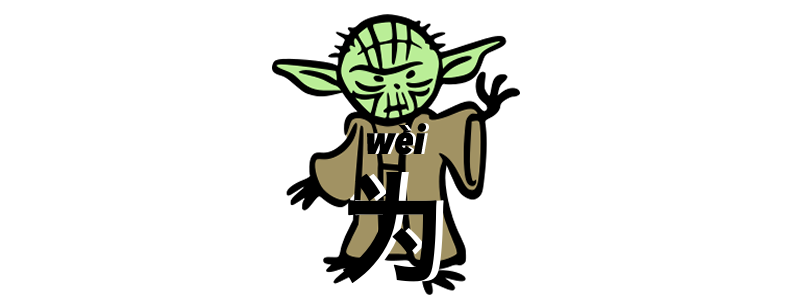Grammar Point:
为 wèi has many functions in Mandarin Chinese. In this article, we are going to discuss how to use 为 wèi to express the meaning of “for”.
Structure
為/为 + Sth or Sb + Verb
The word 为 wèi can once again be translated as “for” in English. However, this time it is used to emphasize someone or something that typically benefits from an action. In many cases, it can be replaced with other Chinese words such as 给 gěi, 替 tì, or 帮 bāng.
媽媽為我做早飯妈妈为我做早饭
My mom made breakfast for me.
(This sentence describes an action (made breakfast) for the benefit of the speaker (me).)
我為公司賺了很多錢我为公司赚了很多钱
I earned a lot of money for the company.
(The speaker (I) is the subject who performed the action of earning money, and the company is the beneficiary.)
咖啡為我的生活提供很多好處咖啡为我的生活提供很多好处
Coffee provides many benefits for my life.
謝謝你為我們加油谢谢你为我们加油
Thank you for cheering us on.
離開你為我的人生帶來幸福离开你为我的人生带来幸福
Leaving you brought happiness to my life.
政府應該為人民爭取福利政府应该为人民争取福利
The government should fight for the welfare of the people.
最近很多人為毛孩子說話最近很多人为毛孩儿说话
Recently, many people are speaking up for furry children.
FYI
毛孩儿 máo háir is a delightful and affectionate expression used to refer to our beloved furry friends, specifically cats and dogs. The term literally translates to “furry children” or “hairy kids” in English. It’s very common to hear it in casual conversations and see it light up social media discussions among pet lovers in Chinese-speaking communities.
為/为 vs 為了/为了
為/为 wèi + Sth or Sb + V or SV
1. To express the reason or motivation behind an action.
2. To emphasize someone or something that typically benefits from an action.
讓我們一起為留學生活做準備让我们一起为留学生活做准备
Let’s prepare for the study abroad life together.
媽媽為我做了很多菜妈妈为我做了很多菜
My mother cooked a lot of dishes for me.
為了/为了 + aim/goal
To express the purpose or intention behind an action. It indicates that an action is done with a specific goal in mind.
為了媽媽的健康我開始學做菜为了妈妈的健康我开始学做菜
For the health of my mother I began to learn to cook
為了學中文,我決定去台灣为了学中文,我决定去台湾
In order to learn Chinese, I decided to go to Taiwan.
Sometimes 為了/为了 is 為/为 + 了
Chinese learners often get confused with the usage of 为 wèi and 为了 wèile, particularly when 为 wèi is followed by 了1 le indicating completion of an action.
去年我的身體很不好,所以媽媽為了我,做了很多菜去年我的身体很不好,所以妈妈为了我,做了很多菜
Last year I was not healthy, so my mother cooked a lot of dishes for me.
你為了你的女朋友做了那麼多事,她都知道嗎?你为了你的女朋友做了那么多事,她都知道吗?
You’ve done so much for your girlfriend, but does she know about it?
Practice
TouchHover over the space to see the answers.
✔️ I learned a lot of Chinese for my boyfriend.
我為我的男朋友學了很多中文我为我的男朋友学了很多中文
✔️ But he didn’t do anything for me.
但是他什麼也沒為我做但是他什么也没为我做
✔️ So I want him to introduce me to a new boyfriend.
所以我要他為我介紹一個新男友所以我要他为我介绍一个新男友
- 为 wèi 1 (HSK 2)
- In order to 为了 wèile (HSK 3)


